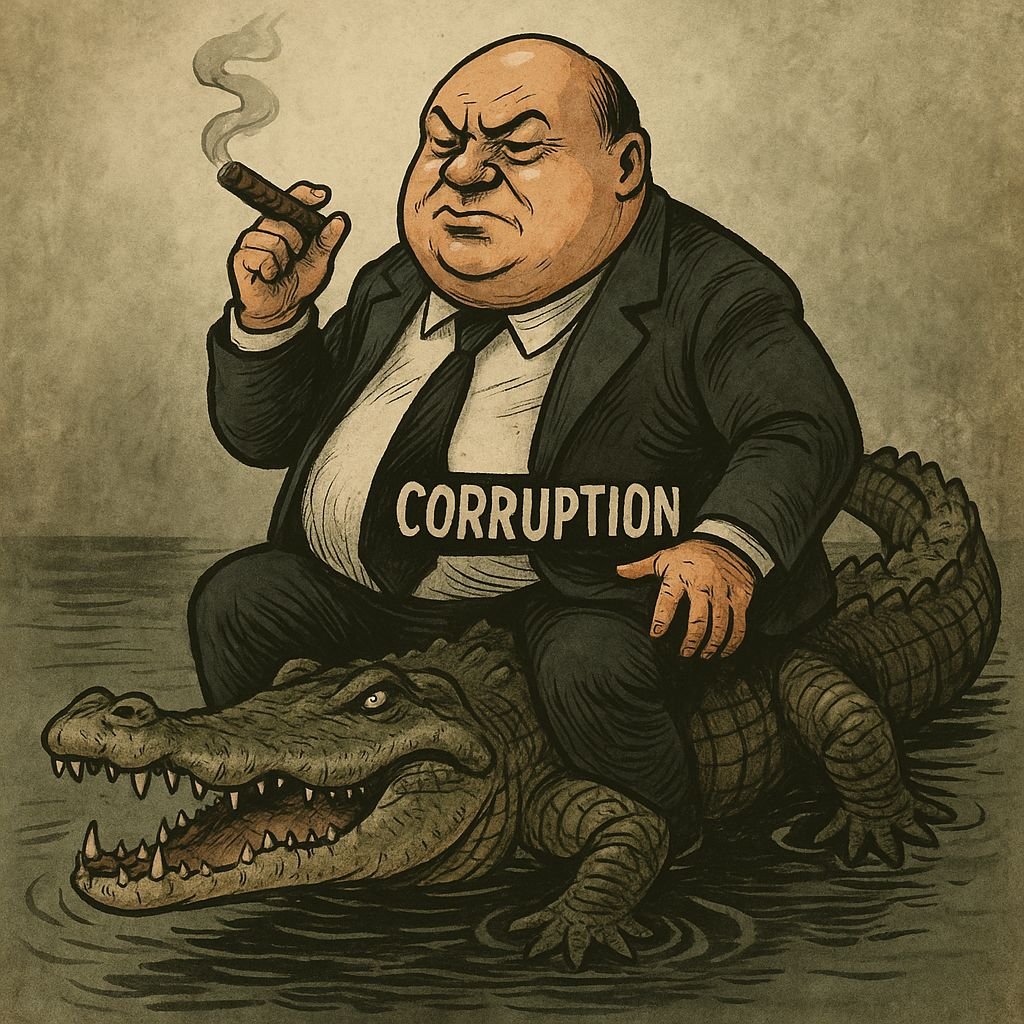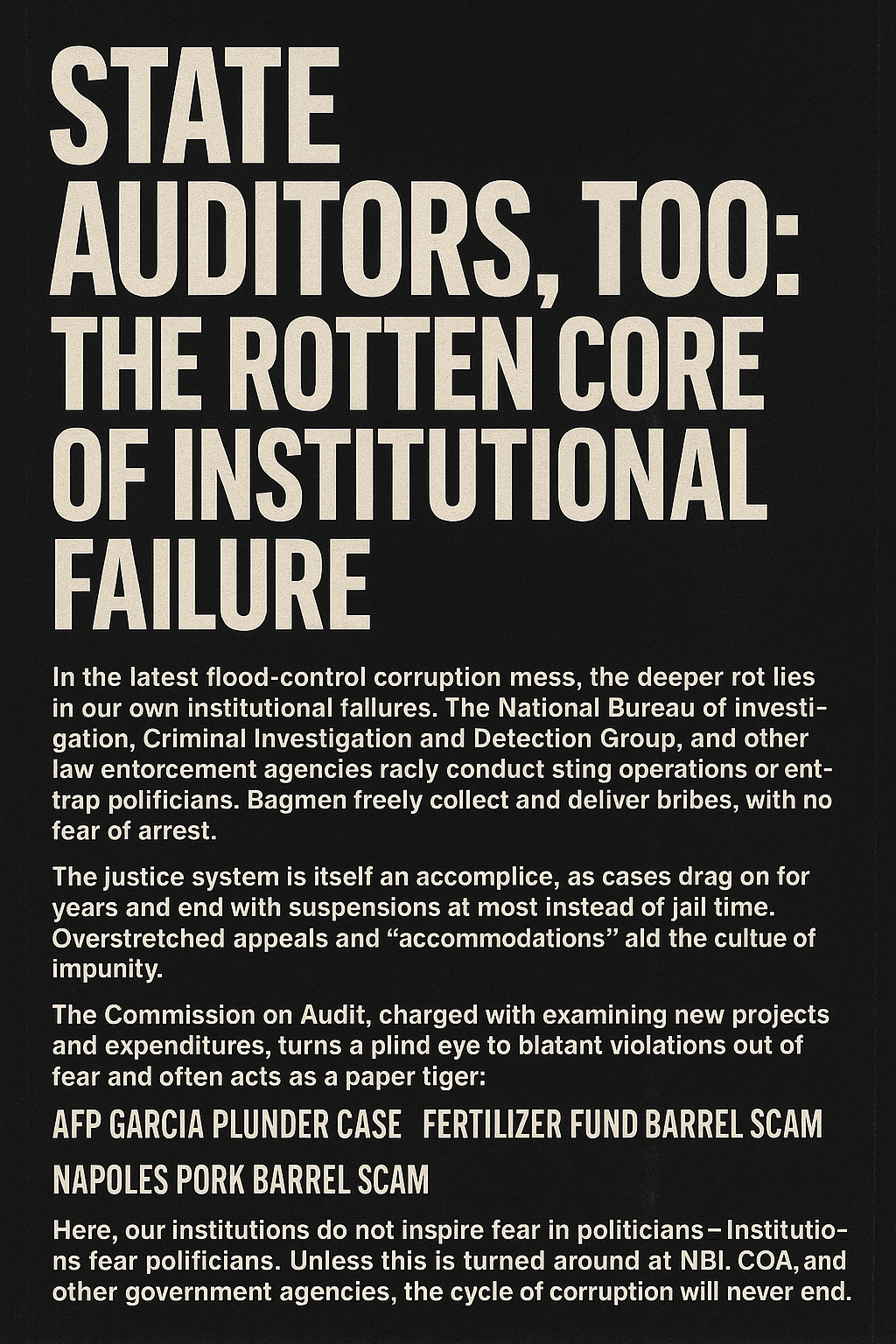State Auditors, Too: The Rotten Core of Institutional Failure
Corruption in the Philippines is never just about stolen billions or shoddy projects. It is about the rot that eats away at the very institutions meant to protect the public interest. The current flood-control scandal, involving overpriced contracts, ghost dikes, and politically connected contractors, is not a singular outrage—it is another chapter in a long, repeating cycle.
No matter who eventually gets convicted—if anyone at all—the cycle will simply reset with new names and new schemes. The core problem is not merely corrupt individuals but institutions that have grown too weak, too compromised, and too fearful to do their job.
Law Enforcement’s Blind Eye
In countries where corruption is genuinely prosecuted, law enforcement agencies routinely conduct sting operations against elected officials. Governors, mayors, lawmakers—even powerful senators—are subject to entrapment and criminal exposure if they accept bribes. In the Philippines, this is almost unthinkable.
When was the last time the National Bureau of Investigation (NBI), the Criminal Investigation and Detection Group (CIDG), or the Philippine National Police (PNP) staged an entrapment against a sitting mayor or congressman pocketing grease money? When has law enforcement intercepted a bagman carrying cash for a governor or senator? The answer is painfully clear: almost never.
The powerful are untouchable, shielded not by innocence but by a culture of protection. Their bagmen operate openly, collecting kickbacks from contractors and delivering envelopes of cash, yet they move without fear of arrest. In the rarest of cases when an elected official is indicted, it is usually after they fall out of political favor, not because institutions acted independently.
Justice Delayed, Justice Denied
But even when charges are filed, the justice system itself becomes an accomplice to corruption. Cases drag on for years, delayed by endless motions, appeals, and so-called “technicalities.” The outcome is rarely jail time. At best, an official may face suspension or a watered-down penalty. At worst, the case dissolves into nothing, the charges dismissed or quietly settled through backroom negotiations.
The pattern is familiar:
- Years of delay. A case may sit in preliminary investigation for half a decade, long enough for witnesses to give up and evidence to go stale.
- Negotiated outcomes. “Accommodations” are reached, often through influence-peddling, so cases are downgraded or dismissed.
- Appeals that never end. Even a rare conviction is not final. It becomes the starting point of a drawn-out appeal process, sometimes taking decades, by which time the public has lost interest and the official has already finished multiple terms in office.
The message is clear: in the Philippines, corruption does not land you in jail. It lands you in court for years, until the case dies a natural death.
The Toothless Watchdogs
Perhaps the most damning example of institutional weakness is the Commission on Audit (COA). It is present in every local government unit (LGU) and agency, with auditors tasked to examine every disbursement, every project, every contract. On paper, COA is the backbone of financial accountability. In practice, it is a paper tiger.
Auditors, often underpaid and vulnerable, are expected to stand up to politicians who control budgets, contracts, and appointments. The result is predictable: most auditors look the other way. In blatant cases of overpricing or ghost projects, reports are either sanitized or delayed. Fear of reprisal and professional stagnation pushes many to adopt a survival strategy—stay silent, approve the papers, and avoid making enemies.
The scandal involving a COA commissioner’s spouse allegedly tied to flood-control contracts only highlights this rot. If the very guardians of public funds are entangled in conflicts of interest, what hope remains for real oversight?
The Culture of Impunity
This is the central tragedy: Philippine institutions do not inspire fear in politicians. Instead, politicians inspire fear in institutions. Law enforcement officers hesitate to touch them. Auditors tread lightly around them. Prosecutors negotiate with them. Judges defer to them.
In this inverted reality, accountability flows downward, not upward. Petty employees are punished for small-time graft, while high-ranking officials walk away from billion-peso scandals unscathed. The message to the public is corrosive: power protects, power shields, and power absolves.
This culture of impunity is why corruption thrives. It is not merely tolerated; it is expected, built into the system as a cost of doing business and a prerequisite of political survival.
The Weakening of Institutions
The repeated cycle of corruption scandals reveals one truth: institutions designed to check abuse have been systematically weakened.
- Law Enforcement. Instead of acting as watchdogs, police and investigative agencies often serve as bodyguards of the powerful, protecting them from accountability.
- Justice System. Courts and prosecutors, susceptible to political influence, drag their feet or negotiate cases into irrelevance.
- Auditing Bodies. Embedded in every agency, COA auditors too often fold under pressure, producing reports that are ignored, delayed, or diluted.
- Political Will. Leadership at the top is inconsistent—sometimes cracking down on corruption when it is politically convenient, but rarely establishing lasting reforms.
The result is a vicious cycle: corrupt officials operate with confidence, knowing that even if they are caught, the system will protect them.
Historical Case Studies: Proof of Institutional Failure
The flood-control mess is only the latest episode. The Philippines has seen this story before, played out with different actors but the same script.
1. The AFP Garcia Plunder Case
In 2004, Major General Carlos Garcia of the Armed Forces of the Philippines was charged with amassing nearly ₱303 million in ill-gotten wealth. He was caught after U.S. authorities flagged his wife and sons for attempting to smuggle undeclared cash into America.
Despite mountains of evidence—lavish homes, luxury cars, bank accounts abroad—the case dragged for years. In 2010, Garcia struck a plea bargain, returning only a fraction of the alleged loot. Instead of life imprisonment for plunder, he walked away with minor charges and a reduced sentence. The military’s reputation was scarred, but the message was the same: the system negotiates with thieves.
2. The Fertilizer Fund Scam
In 2004, Agriculture Undersecretary Jocjoc Bolante was accused of diverting ₱728 million in fertilizer funds meant for poor farmers into the campaign kitty of then-President Gloria Macapagal Arroyo. Investigations revealed ghost deliveries, overpriced supplies, and fabricated beneficiaries.
Yet, despite Senate inquiries and public outrage, Bolante evaded accountability for years, even fleeing abroad. When he returned, the Ombudsman dismissed key charges. The case became another symbol of how political connections can dissolve corruption cases into nothingness.
3. The Napoles Pork Barrel Scam
Perhaps the most notorious of all was the 2013 Priority Development Assistance Fund (PDAF) scam involving Janet Lim Napoles. Lawmakers were accused of funneling their pork barrel allocations into fake NGOs controlled by Napoles, siphoning off an estimated ₱10 billion.
Three senators—Juan Ponce Enrile, Jinggoy Estrada, and Bong Revilla—were charged with plunder. Yet more than a decade later, the cases drag on. Revilla was acquitted and even returned to the Senate. Enrile, despite his advanced age, remains a political player. Estrada, too, is back in government. For ordinary Filipinos, the sight of accused plunderers walking free and reclaiming power reinforced the futility of demanding accountability.
The Flood-Control Scandal as a Symptom
The billions lost in flood-control projects are not an isolated event. They are the natural product of a broken system. Ghost dikes and substandard seawalls are simply the physical manifestation of institutional failure.
Every missing slab of concrete, every collapsed embankment, every unbuilt spillway is proof of a chain of negligence:
- Politicians who demanded kickbacks before approving contracts.
- Contractors who cut corners to recover bribe money.
- Auditors who failed to sound the alarm.
- Law enforcement agencies that never investigated.
- A justice system that will eventually bog down any case until it disappears.
Until this cycle is broken, there will always be another scandal waiting to happen.
What Must Change
Breaking the cycle requires more than rhetoric. It requires institutional transformation.
- Independent Law Enforcement. Agencies must be insulated from political influence, with strong protection for officers who pursue corruption cases against the powerful.
- Fast-Track Anti-Corruption Courts. Corruption cases must have strict time limits to prevent endless delays. Verdicts should be swift, final, and enforceable.
- Empowered Auditors. COA must be reformed so auditors are shielded from political pressure, given competitive pay, and held accountable for negligence.
- Transparency by Default. All government projects should have mandatory online disclosure—from bidding to implementation to completion—so that citizens, journalists, and watchdog groups can monitor progress in real time.
- Cultural Shift. Above all, society must demand accountability not just from individuals but from institutions. Until Filipinos insist that the system itself change, corruption will remain the defining feature of governance.
Conclusion: Fear Must Be Reversed
For decades, the Philippines has lived with an inversion of accountability. Politicians do not fear institutions; institutions fear politicians. This must be reversed. Until the powerful tremble before the law, until auditors can act without fear, until law enforcement dares to pursue bagmen and lawmakers alike, corruption will remain the nation’s curse.
The flood-control scandal is only the latest reminder. There will be more—another road, another bridge, another housing project—because the names and faces may change, but the institutional weakness remains. Unless reformed, the cycle will never end.
A country that cannot make its leaders fear the law will remain forever at their mercy. And the people, robbed of both money and trust, will continue to pay the highest price.




